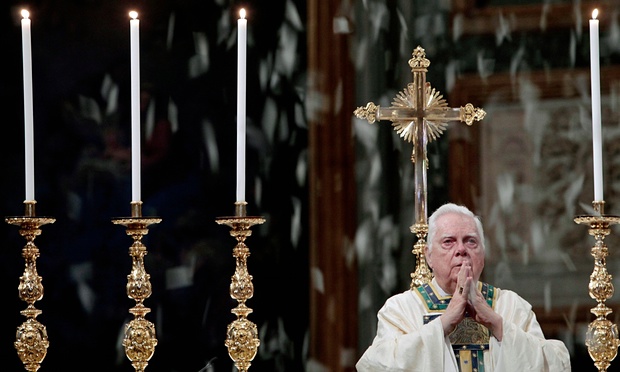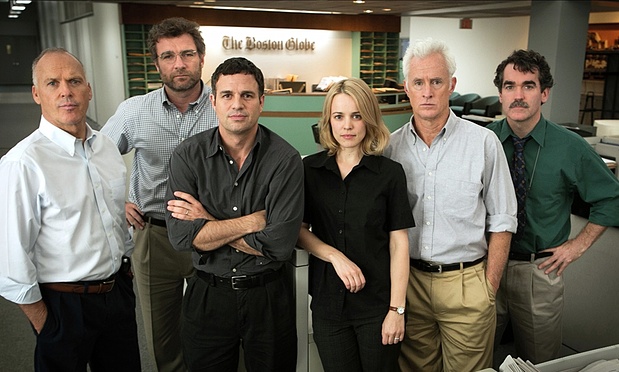How Cardinal Disgraced in Boston Child Abuse Scandal Found a Vatican Haven
By Stephanie Kirchgaessner
When Cardinal Bernard Law was forced under public pressure to resign as archbishop of Boston in 2002, he was considered a pariah within the ranks of the American Catholic church. In an editorial at the time, the Boston Globe – which had helped bring him down by exposing how the archdiocese had covered up years of sexual abuse by paedophile priests – said that Law had become the “central figure in a scandal of criminal abuse, denial, payoff and coverup that resonates around the world”. The story behind the Globe’s expose is the subject of a new film called Spotlight, which stars Michael Keaton and Mark Ruffalo and is being released in the US on Friday. (It will reach British cinemas on 29 January.) The movie is likely to revive questions about the church’s handling of sex abuse – both then and now – and revive memories of a painful period for abuse victims and millions of American Catholics. But Law is likely to be insulated from any controversy: in the 13 years since his resignation, he has found a haven far from Boston, behind the walls of the Vatican. At the time of his resignation, the cardinal was being pilloried publicly for having turned a blind eye to sex abuse, and embodying a culture that “reflexively placed the reputation of the church above the pain of victims”. But for years, he served in an honorific role as the archpriest of the Basilica of the Santa Maria Maggiore until his retirement, at the age of 80, in 2011. Today, Law enjoys the quiet life that any senior and retired cardinal living in Vatican City would: he is a fixture of the annual 4 July Independence Day party held by the US embassy to the Holy See, and was until recently considered an active and important conservative voice within many of the Vatican offices where he served. “He is living out his elderly age just like many elderly cardinals who are in Rome or elsewhere do, and the way we probably will too if we make it over 80 years old,” said Federico Lombardi, the Vatican spokesman. Robert Mickens, a longtime Vatican journalist and editor of Global Pulse magazine said Law was “everywhere” during his active years in Rome and apparently believed he had been “badly done by”. Law could not be reached by the Guardian and is known to avoid interviews. “I think most of the other cardinals see him as a victim rather than anyone who was culpable of anything,” Mickens says. “He was not punished. But if you look at it in terms of his power in the church in the US, he was knocked down a peg.” At the same time, Mickens notes, the influence he wielded was greater in some respects once he left Boston, because he was living in the heart of the church. “He did not lose his influence. He was a member of more congregations than any other bishop. There are nine or 10 and he was a member of six of them,” Mickens said. “Cardinals that are members of these offices can’t always go to the meetings – they are not in Rome – but Bernie Law did and he goes everywhere and he keeps his head held high.” Law was considered to have played a role in the controversial decision by the church under Pope Francis’s predecessor, Pope Benedict, to investigate American nuns who were accused of promoting radical feminist ideas that were considered incompatible with the church. The investigation ended last year with a mild Vatican rebuke for the nuns. Mickens has a nuanced view of Law. While the cardinal’s name is almost synonymous with the church’s cover-up scandal – in which senior officials moved abusive clergy from one parish to another even when they knew the priests had abused children – Mickens said Law was known before the scandal as an important promoter of civil rights in the US. “In many respects, he did a lot of good things. He was one of the first people, when he was a priest in Missouri, to be in favour of racial harmony, and he worked against racial prejudice,” Mickens says. But for men like David O’Regan, who was abused by a member of the Boston archdiocese in the 1960s and suppressed the experience until the Boston Globe’s investigation made it public in 2002, Law is still a symbol of the church’s legacy of abuse. “Being caught in [Law’s] lie, that was such a betrayal to me, because my faith meant so much to me,” he said.
Now serving as the New England director of the activist group Survivors Network of Those Abused by Priests, O’Regan said that he was one of about 100 people who attended a Spotlight screening last week, organised by the film’s distributor, Open Road Films. There were several advance screenings of the film for clergy sex abuse survivors and their families and friends. The anger and sadness O’Regan felt in 2002 was resurrected during the screening, but he said he is thankful for the film. “I felt validation,” said O’Regan. “When we first came forward to the church, we were not believed, they minimised what happened to us.” O’Regan said he and a few other survivors gathered at a restaurant after the screening, talking late into the night. Many of the people there had not seen each other since the scandal caught worldwide attention in 2002. “It was a sort of a reunion in one way,” O’Regan said. Cardinal Sean O’Malley, the current archbishop of Boston, said the film “depicts a very painful time” in the US Catholic church’s history and that the archdiocese continues to ask those harmed by the clergy abuse scandal to grant foregiveness. “The media’s investigative reporting on the abuse crisis instigated a call for the church to take responsibility for its failings and to reform itself – to deal with what was shameful and hidden – and to make the commitment to put the protection of children first, ahead of all other interests,” O’Malley said. O’Regan said he wept many times as he watched the film, and in an interview with the Guardian he became emotional while describing a scene in which reporter Michael Rezendes, played by Ruffalo, comes to the realisation that “it could’ve been any of us” who were abused by clergy. “It could’ve been any of us,” O’Regan emphasised. “That’s a horrible reality I had as a child.”
|
.
Any original material on these pages is copyright © BishopAccountability.org 2004. Reproduce freely with attribution.

